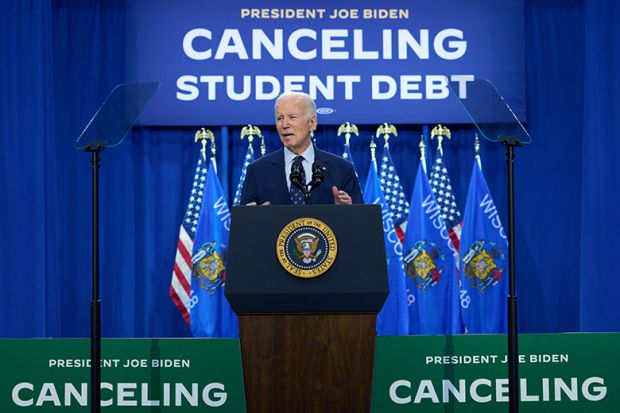Progress on Joe Biden’s signature student debt forgiveness scheme but disappointment on his civil rights agenda in his final days in office was symbolic of a presidency which leaves a “complicated legacy” on higher education, according to experts.
Biden’s grand attempts at a wider student debt forgiveness plan have been repeatedly blocked by the courts, though he did succeed in wiping out about $183.6 billion (£150 billion) in debt. And with an additional 150,000 student loans forgiven this week, the outgoing US president brought the total number who have had their debt cancelled to over 5 million.
“A number of those programmes may well continue on a sort of quiet autopilot into Trump 2.0,” Andrew Rudalevige, Thomas Brackett Reed professor of government at Bowdoin College, told Times Higher Education.
“But student loan forgiveness had no structural impact on the affordability of or access to higher education.”
With Republicans likely to focus on the “illegal” amount of debt forgiven and left-wing Democrats claiming he should have done more, Robert Kelchen, professor of educational leadership and policy studies at the University of Tennessee, Knoxville, said this was a good example of how President Biden will be remembered.
“President Biden is likely to have a complicated legacy on higher education that is interpreted differently across the political spectrum,” he said.
“People are going to interpret his higher education legacy in a way that matches their prior ideological convictions.”
Following the Bright v Loper Supreme Court decision that limits the ability of federal agencies to issue regulations, Kelchen also said that the Biden administration will be seen as “the end of an era of executive power in American higher education”.
John Thelin, emeritus university research professor at the University of Kentucky, said Biden’s efforts in loan forgiveness solidified his legacy as a senator from the 1970s “golden era” of student aid programmes.
The student loan forgiveness programmes may help to reduce defections of younger voters to the Republicans, but it will not help the Democratic Party gain a lot of new voters as it bids to retake the White House in 2028 without Biden, Thelin added.
“Biden gets some gains for honouring a long-time pledge, the nation gains some breathing room to allow young adults to pay less for student loans, freeing them up to perhaps buy first homes and other items such as cars,” he said.
“The balance sheet is [that] Biden gains a substantial amount of goodwill and sighs of relief, but not a seismic shift in political party affiliation and voting.”
And Biden also lost votes in the 2024 election by his attempts to expand Title IX protections against sexual discrimination to gay, lesbian and transgender students, according to Thelin, particularly among suburban “middle-class, middle-of-the-road” Americans.
The Title IX rules had already been halted in 26 states by Republicans and have now been struck down nationwide after a federal judge ruled that they overstepped the president’s authority. Donald Trump has previously pledged to “terminate” the protections on his first day back in power.
“I don’t think Biden’s efforts will be regarded as a failure, exactly, given that they have been struck down nationally by a single district court judge at the behest of a handful of red states,” said Rudalevige. “But obviously they don’t have any staying power either.”
While few will forget the “bungled” rollout of student aid applications, he said the Biden years will be remembered for issues that were largely unrelated to the president – including the Gaza protests on campuses, the congressional hearings involving college presidents, and interventions by state governments.
With hindsight, Rudalevige said this period will be remembered warmly, if only as a “respite between two turbulent Trump terms” that might lead to attacks on students and endowments.
“Biden, at least, did not shoot at his own goal, seeking to undermine a sector that has been hugely successful economically, culturally, and in terms of soft power,” he said.
“Importantly, his was an administration that respected non-profit higher education and expertise generally. But it’s hard to argue that higher education is much better situated to defend those goals four years on.”
请先注册再继续
为何要注册?
- 注册是免费的,而且十分便捷
- 注册成功后,您每月可免费阅读3篇文章
- 订阅我们的邮件
已经注册或者是已订阅?

